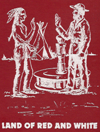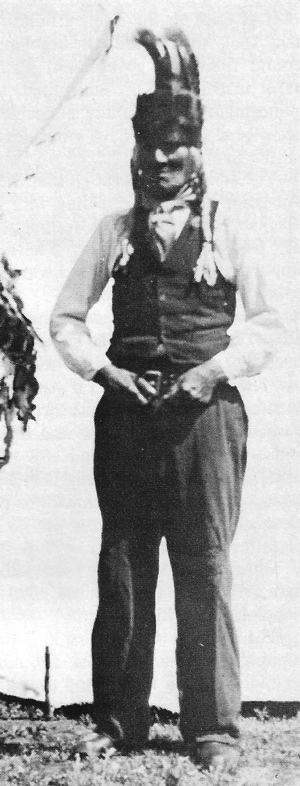 AN ACCOUNT OF THE FROG LAKE MASSACRE
AN ACCOUNT OF THE FROG LAKE MASSACRE
As Told to A.E. Peterson by George Stanley (Mesunekwepan)
Courtesy of the Alberta Historical Review - Winter 1956.
Editor's Note: On April 2, 1885, the outbreak of the Riel Rebellion was tragically marked by the massacre of nine residents of Frog Lake, 125 miles east of Edmonton, and the destruction of the tiny settlement by Big Bear's band of Plains Crees.
Those killed were: Indian Agent Thomas Quinn, farm instructor, John Delaney, John Gowanlock, William Gilchrist, Father Fafard, Father Marchand, George Dill, Charles Gouin, and John Williscroft. In addition, Mrs. Delaney, Mrs. Gowanlock and W.B. Cameron were taken prisoner but later reached safety.
This account is by a member of the Frog Lake band. His people, the Woods Cree, did not participate in the massacre but were present during the events which followed.
I am shaking hands with you (A.E. Peterson) in the name of God so that what I say may be the truth. I am giving you this story of the massacre in the name of God and our King.
At the first Indian Treaty given us by Queen Victoria, the Holy Pipestem I have here was used for the first time before white people and Indians alike. At that time my grandfather (Chaschakiskwis) was made Chief of the Frog Lake Reserve. My grandfather lived here before the first Treaty and used to grow potatoes. After he died my father (Ohneepahao) was made Chief. The reason for starting my story in this way is to give you an idea of the people and the condition of things as they existed here before the massacre. The Holy Pipestem is over one hundred years old. My grandfather was eighty years old when he died and my father was nearly eighty years when he died. I am keeping this pipe today but will be soon passing it on to my children as my hair is turning grey.
I was seventeen years old at the time of the massacre but I cannot tell you the day or the month as we Indians were not used to that.

George Stanley
Before the Rebellion us Indians had our houses close together. One day (in 1884) a man named Cutche came over and told my father that a white man - a Government man - had come to Onion Lake the day before and was coming to Frog Lake to meet the Indians that day. My father notified the other councilors, Little Bow, William Gladue and another whose name I cannot remember to go over at once to the Agency building. I hitched up the team and took them over. On reaching the Agent's house we found there, the government man, the Indian Agent, the farm instructor Sam Bellendine, the interpreter, and two policemen. One of these policemen was a big man. They were now going to have a business meeting. They were all seated in chairs.
The Indian Agent spoke first. He said: "Ohneepahao, we are going to have a meeting with you. This man, who has been sent here by the Government, will talk to you now." The Government man said: "I have been sent here on a very important business to you, I want you to listen carefully as I have good news for you all.
"There are two principal things I want to speak to you about. Big Bear wants to come here with his band to camp over the winter. It may be for a purpose, I do not know, but I would be very glad if you would give him permission. You have taken two bands into your reserve already, Chief Paskeweyen and his band and Chief Makeos and his band and I wish that you could also take in Big Bear. He will have to cut wood on your land, catch some fish in your lakes, etc., but for this you will be paid by the Government. Next summer another man will be sent out to find another place for Big Bear."
Ohneepahao replied: "I am willing to let Big Bear come here. We have always been good friends with the white people and the Indians."
The Government then said: "I am very glad. There is one more thing I want to speak about and I want you to listen so that you can understand everything. Well Chief, I want you to accept everything for which I have been sent over. It is all to the good. I wish to find out from you if the Indians will be willing to let the white people build a grist mill at Frog Lake." He did not say how many acres they would need. The understanding was that the Indians should get flour and lumber at half price. "If this mill operates I want you to think of the Keehewins, Chippewyans and the Crees at Onion Lake," said the Government man, "so that they will come to the mill as well. We might get a railroad here in four years' time."
Ohneepahao then asked the other Councilors to speak, Little Bow stood up and said: "We all agree to abide by the word of our Chief but we hope that we will not be deceived in this." All the Government men gave thanks to my father for all he had said and agreed to.
The mill was proceeded with and a store, which had big windows on the south, was built up nearby. Big Bear and his band came from the south in the fall and camped about two miles south of us.
It was nearly Good Friday when the Rebellion started. We were camped on the south-west side of Frog Lake where I was staying there with my father and mother. There was only our family and a few old women there in camp at that time; the other Indians had gone north trapping. The sun was getting low one evening when my father drove over to the Agency. He came home late that evening and said the
Agent and the farm instructor had told him to get everything ready for spring work. He also brought with him one hundred pounds of flour and some other rations to be divided among the other members of the band. The Agent instructed my father to go home, which was a little over half a mile from where we camped that night. Next morning, I told my father I would go ahead on the ice to bring the cattle around.
"I will go with you, and your mother can take the team over with the camping outfit," said my father. The sun was getting quite high by this time as we had slept late that morning. My father instructed me to bring the cattle up to the house while he would wait on the hill.
In those days we did not know what an ox harness was; all we had was a yoke. I brought the oxen up and put the yoke on them to try out the plow. I hitched the oxen to the chain on the plow, and went down to the field and put the plow in the ground but found that the frost was not yet out.
While stopping in the middle of the field near Nepowquata's present house, I saw a man riding quickly towards my father who was sitting on a hill nearby. As soon as I saw this man I immediately unhitched as I could not plough anyway and I wanted to hear what this man was going to talk about. This man was Chakwapokees - one of Big Bear's men. He had the farm instructor's horse and carried a rifle on his side. When I got to the hill they were talking, I looked up at the sun to see if it was dinner time. It was nearly midday.
I noticed that my father was surprised to see Chakwapokees ride the instructor's horse and asked him about this. Chakwakopkees answered, "Have you not heard the news? So you not know what is going on down around the Agency. We took all the whites early this morning but we are not going to hurt them. You can understand why I have this horse."
My father said: "I was over to the Agency yesterday but did not hear of any trouble. I am surprised. "While they were thus talking, all of a sudden and like thunder, we heard several shots one after the other down towards the Agency. Chakwapokees wheeled his horse and galloped south as fast as he could go.
I told my father that I was going over to see what had happened, but he warned me to stay away as there might be danger. I did not listen to him further but started towards the shooting. On looking back, I saw my father also coming. He was taking the road around by the bridge.
When I reached the creek I plunged into the water up to my waist as I was in a hurry. I increased my speed because of the cold water. I heard several more shots while running from the creek. As I reached the bluff just north of the agent's house, I met a young woman from Big Bear's band crying at the top of her voice: "All the priests are killed and all the white people are killed."
After this woman had told me the news, I ran to the top of a little hill nearby. From there I could see several Indians in a hollow near the agent's building and a little to the north, some standing, others on horseback with weapons in their hands. By the time I got there they had all left. Here I found on the hill one of the Fathers lying helpless on the ground with blood streaming from his throat. He was still alive, breathing slowly. I said to him: "I am very sorry but it must be God's will." I took some grass to try and wipe away the blood which was coming from a gash in his throat. This was not very satisfactory, so I took my black silk handerchief and tied it around his neck. He had his eyes closed but was still breathing as the blood trickled away from his throat at intervals. As I was bandaging him up I noticed that he struggled hard to get his breath. He had his robe on with a watch chain on one side and a cross on the other. I stayed with him till the last. This was about one hundred and fifty yards north of the Agent's house.
After I finished working with the priest and knowing that he was dead, I made for the Agent's house. I had only gone a few steps when I found the farm instructor and a Father lying dead on the ground. I began to get frightened and ran on a short distance but returned to the bodies. I made another start towards the agency and had not gone far when I found the manager of the grist mill dead on the ground. I walked about ten yards when I heard a noise behind me. "Cheskwa-cheskwa." I stopped and waited - it was my Uncle Kapechos, who had been sent ahead by my father to keep watch on me. I felt better now as being alone among those dead bodies was not a pleasant feeling.
Kapechos and I walked over to the Agent's house. Here we found the Agent and the carpenter lying dead just outside the building. We stopped for a while as we were afraid to go to the church where the other Indians had gathered. After a while I told Kapechos that we had better go over and see what Big Bear was doing and he agreed after some hesitation. It was about a quarter of a mile away.
When we got there everything was damaged. I saw two kegs of wine that the Church had had. I saw the Indians open these kegs and drink the wine. The rest they poured out on the ground. A few of Big Bear's Indians clothed themselves in the priest's clothes. I joined in with them as they were having a good time. I went to the priests' house and found on the floor a good black hat. I took this and put it on my head. Next I went to the Hudson's Bay store which was on a rise a little to the northeast of the church. Here I met my father who had just come up. He was glad to see me and said: "It is hard to see what has happened here. There has been a lot of bloodshed this day on our land. I never expected to see this. I will keep you with me from now on."
While we were talking several of Big Bears's men came running towards us. They were heading for Mr. Simpson's house, the manager of the Hudson's Bay post. As the door was locked they could not get in so they started to yell and dance on the ground outside. An old man by the name of Kanephat was some distance behind and when he came up he asked: "Why don't you go in?" When he found that the door was locked he said: "This is the way to do it," and hammered the door with the stock of his gun. He did not succeed the first time but the second time he broke the lock of the door. "Now go right in," he said, and at once they all rushed in. My father was packed in with the Indians and the noise they made was something awful. They started to destroy things. The door of Mr. Simpson's private room was open so I walked in to have a look around. Lying on a chair near the door were four beaver robes. I took these under my arm and walked out. When my father noticed me he instructed me to go back and put the robes where they belonged.
It was awful to be there. Big Bear's men were dancing upstairs and breaking things to pieces. My father, who by this time began to show annoyance, pushed his way through and went to the stairs. He got half way up but could not get any further as there were too many Indians. I tried to follow him.
My father called to Big Bear and said: "I am surprised that you would allow your men to carry on like this. Are your people crazy or what is the matter, your minds cannot be right. If I had known of this I would have given you twenty-five head of cattle to kill instead of massacring the white people the way you have done, besides all the damage. All of you men get down and take nothing away from this house. Don't you know that Simpson is the man who had provided us with food? Treat him like your father and do not disturb him. You know he is married to an Indian women. If you do not like my talk, take a gun and shoot me."
I was getting afraid and excited as I expected to see my father any moment come tumbling down the stairs a dead man. No shooting, however, took place, the men dropped everything and left the house. My father shut the door behind.
The Hudson's Bay store was their next place of amusement. The reason for them not going there first was that they expected to find many valuable things in Mr. Simpson's private dwelling. We did not follow them further. My father's mind turned towards home. He was afraid that Big Bear had laid plans to take the Frog Lake band prisoners. "George, let us go home. They have accomplished what they set out to do. There is nothing more."
We started for home but had not gone far when Big Bear's men again rushed into Simpson's house. We looked back and saw them go in. My father held my hand for fear that I would return. This was about three o'clock in the afternoon.
When we got back to the house there was nobody home. The squaws from Big Bear's band had moved camp to near where I had been trying to plow that morning, while the men were busy with destruction around the Agency. They had taken my mother along with them to their camp. I spotted our tepee with the Holy Stem just outside. It was in the centre; they had put it there purposely to show that we were captured. We walked into our tepee. As soon as Mother saw us she broke into tears. "All of us will be killed now this day," she said; tears came into my eyes in pity of my mother. After we had comforted her by saying that we thought everything would come out all right, she prepared something to eat; but I could not eat after all the excitement. I said I would go out and look for the horses. This was merely an excuse on my part as I did not want to show my nervousness. My father told me not to go far as it would be better for us to be together.
As soon as I got outside I made for the same hill that we had been sitting on that morning when the first shots were fired. On that hill I could overlook the country to the south to see if Big Bear was coming and, as it was a very hot day, I wanted to catch the breeze.
I had not been sitting there long when I saw Indians bringing over two white women they had captured and made prisoners. The women were walking ahead, the Indians following behind. A short distance behind these Indians came two squaws with a large shawl outstretched between them and under which was Mr. Cameron, the only white man saved. The squaws belonged to the Frog Lake band of Indians.
As I was not an eyewitness to see the escape of Mr. Cameron, I can only tell you what I heard then and was common knowledge to us Indians at that time as to Mr. Cameron's getaway. While Big Bear was busy ordering the white people together at the Agency, Mrs. Simpson hid Cameron in a small building close to the Hudson's Bay store. She put clothes over him. When the shooting started, Mrs. Simpson and Mrs. John Horse took a big red shawl and brought him into the bush where they concealed him till after the shooting. Later they brought him to camp.
After I made sure that these Indians were coming into camp with the prisoners I ran back and told my father what I had seen.
These two women were brought to our tent. As they came up one of them fainted and fell to the ground. Mother brought out some water and gave her. Father said: "I am glad that you have been brought here, I will see that you are not harmed."
Mr. Cameron had been brought up by this time and when he heard my father's voice went up to him, took his hand and said, "Haymen-Haymen nechaw maskoch nakanepin anoch." ("It is hard - it is hard, maybe I'll be killed today.") "Namoyah," said my father, "neither you nor these two women shall be killed. I will speak for you."
Mr. Cameron was brought into the tent and given a seat, he came up to me, shook hands and repeated the same words. But he did not recognize me until he had been told that I was Ohneepahaos' son.
Big Bear set aside a special tent for the two women that had been taken prisoners and ordered J. Prichard and Budreau, interpreters, to keep watch. A meeting was called and all the Indians gathered. Some time before this a messenger had been sent north to inform members of the Frog Lake bandâwho were out trappingâof what happened.
On the return of these Indians my father felt more confident and ordered them to save the white people at all cost. Big Bear, on the other hand, warned them of danger if they did not submit to his commands. J. Prichard and Budreau were friendly to Mr. Cameron and the two women prisoners so, in company with Isadore Moyah, John Horse and Yellow Bear, kept close guard, fearful that some of Big Bear's men might take revenge.
When morning came, Big Bear put up a large tent for a dance, and a general meeting was called to discuss future plans. Guns were placed inside the tent. Big Bear and Imasis were sitting together while Wandering Spirit sat on a bench near the door with a gun resting on his shoulder. My father and I were some distance down from the door. Little Bow, Wm. Gladu, Isadore Moyah and John Horse were also in the tent. This was about ten o'clock in the morning.
Chief Saskaskooch, from Onion Lake, came driving up to the tent in a buckboard, just as we had all gathered. He was met by some of Big Bear's men and brought into the tent where he was given a seat next to my father. He was dressed in a blanket coat with a big strap for a belt, a fox skin for a cap and carried a big butcher knife on his side. He stood up fanning himself as he said: "I just came over to see if what I have heard is true. As I came along by the Agency I noticed several dead people there, and the buildings were destroyed. I am very sorry to see what you people have done. We have at Onion Lake a Church of England minister and Indian officials and we do not want them to be killed in this way. I left guards there to protect them. There are some Indians there too who might start trouble so I must go back tonight. Let this be the finish to your work."
My father agreed to all that had been said. Big Bear did not make any answer but Wandering Spirit jumped to his feet, loaded his gun, went up to Saskaskooch and pointed the barrel to his face. He said: "I will blow your brains out." My father jumped up immediately and grabbed the gun and said: "CheskwaâCheskwa, my friend. If you will not shoot I will give you a cow that I have down in the swamp." Wandering Spirit turned and went to his seat.
Saskaskooch did not seem the least bit worried as he pulled out his big knife and told Wandering Spirit to get up and face him. He said: I will cut you to pieces, although I have only one arm I am not afraid of you. I used to be in front when we fought the Blackfoot Indians. You were behind then. It is a shame to see how you have butchered these innocent white people there, but you cannot scare me."
Big Bear now spoke and expressed his surprise at the way they were carrying on. He ordered that another meeting be held in two days so that the Indians from Onion Lake could be present.
"If anyone here is caught running away until the next meeting is held, he will be killed." added Wandering Spirit.
The meeting took place as planned and everything came off quietly, the Indians all going back to their respective camps.
This interview was made in 1931 by Mr. Peterson. This story was translated into English from Mr. Stanley's native Cree Language by interpreter George Fiddler.


